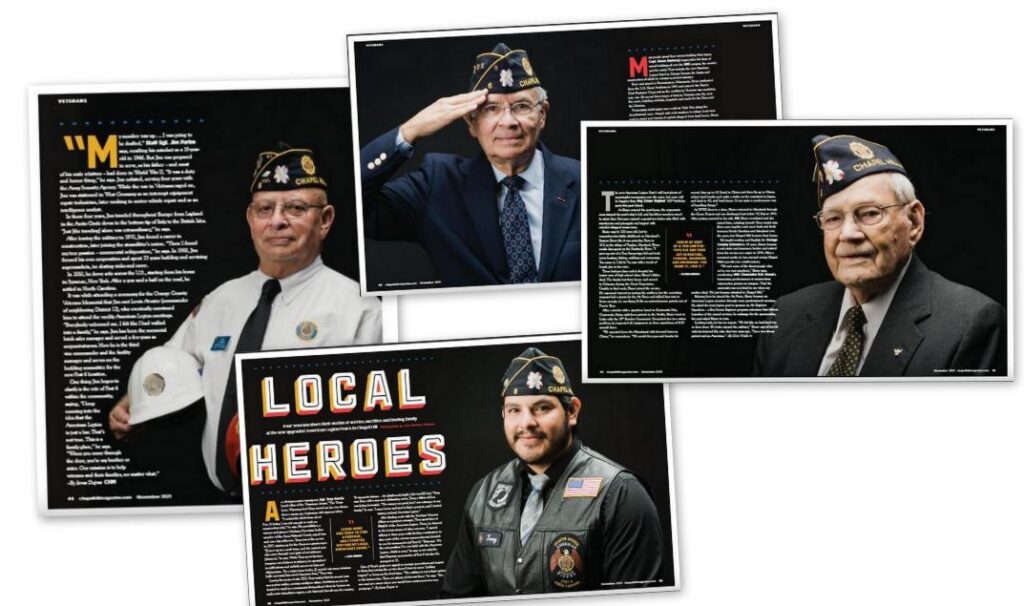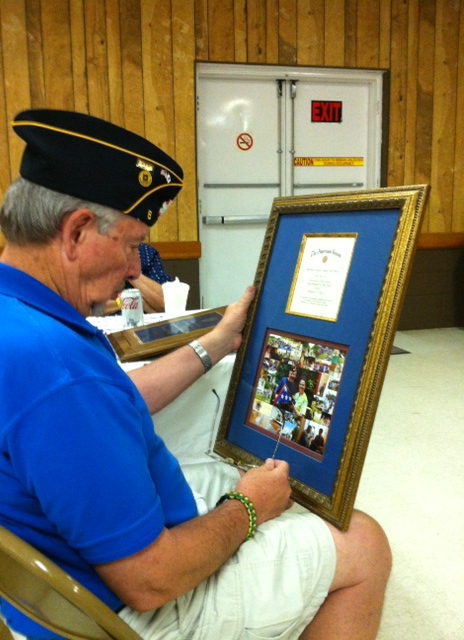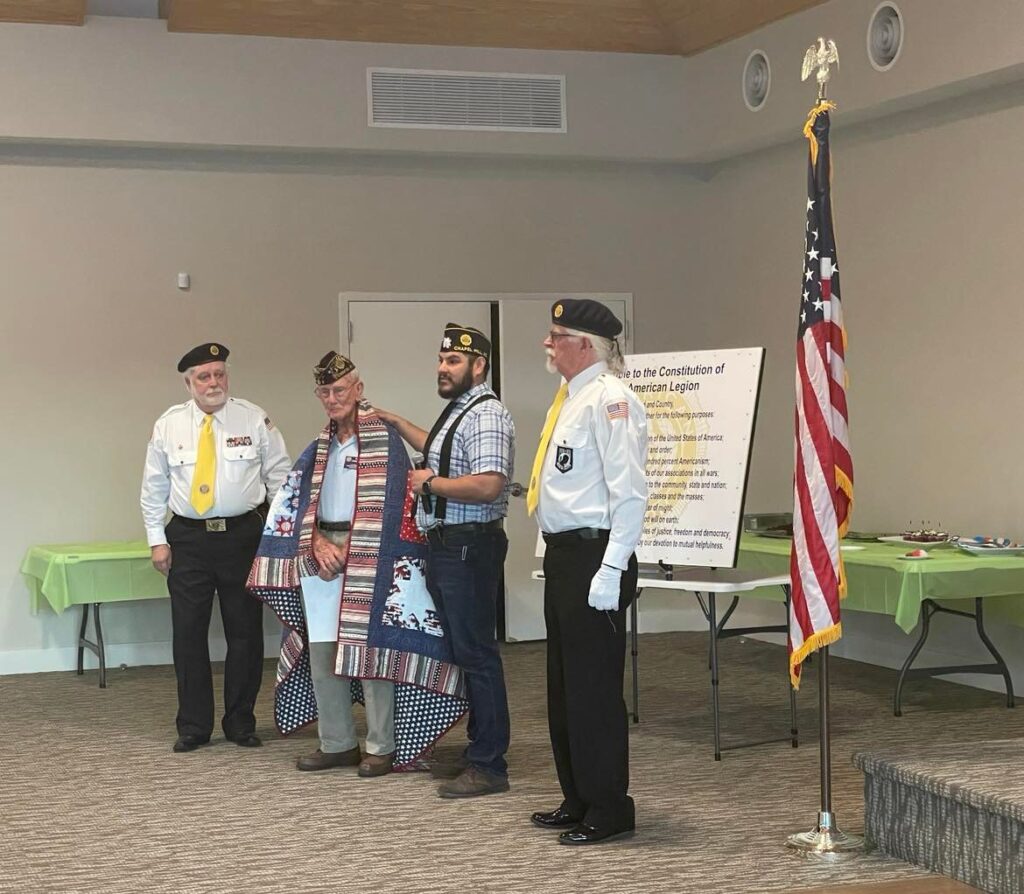The American Legion Officers’ Guide provides everything you need to know about establishing, operating, and promoting a Post. Here is a link to the guide.
We share here some of the content of the Guide as it refers to the duties of Post officers. This is where “seekers” should go to find out more about each position. Why? Everyone should understand what is done and by whom. You may find that you have knowledge, experience, and energy for one or more positions. Why not volunteer to assist one of our officers in their work or get involved in a committee or group that needs help. Learn more so you can proudly share with the public what we do–what you do as you say, “I AM THE AMERICAN LEGION.”
Post Executive Committee (PEC)
Running even a small post is more than a one-person job. Therefore, a post constitution should provide for a full group of post officers, as well as an executive committee. Others are elected to fulfill specific roles. It’s up to the commander to get them to work together for the post’s success. Start the year by having an organizational meeting of the post’s officers and executive committee. This can happen even before installation, and the outgoing post commander and adjutant can be invited to attend.
Post Officers
Commander
The ability to lead is recognized by election to the office of post commander. Now, draw on that ability and experience while developing new skills to help the post prosper. The charge accepted, commander, is broad and difficult. How you respond will determine to a large degree the standing of The American Legion among associates and within the community. The support of district
and department officers, the information in this guide, and help from post officers will together make performing the job possible. Look to the overall operation of the post and realize you have stepped to another level. At first it may seem the step is too high, but as time goes by, following the suggestions and recommendations in this guide, the year as commander will be most rewarding.
Adjutant
The adjutant is the primary administrative officer for the post. Post activities revolve around the adjutant. Most posts retain a good adjutant over a period of years. The role of adjutant provides continuity for a post. While the commander’s duties are largely inspirational and executive, an adjutant’s duties are administrative and functional. The commander navigates the ship, while the adjutant is the engineer who sees that the ship’s machinery is working and maintained. The adjutant is the personnel officer and personal point of contact for individual members of the post. They
continuity for a post. While the commander’s duties are largely inspirational and executive, an adjutant’s duties are administrative and functional. The commander navigates the ship, while the adjutant is the engineer who sees that the ship’s machinery is working and maintained. The adjutant is the personnel officer and personal point of contact for individual members of the post. They
maintain membership records and minutes of meetings, check up and assist the work of the other officers and committees, and publish official orders, announcements and communication with post members. All post records should be maintained and accessible by the adjutant, in a comprehensive filing system. The office involves a great deal of work and attention to detail. An effective adjutant is an essential component of a successful post. It is suggested that some degree of compensation should be paid to the adjutant, particularly in large posts, due to the commitment required by the role.
First Vice Commander
In most posts, a first and second vice commander are elected, with membership and retention being the primary concern of the first vice commander. While each post is different, a membership campaign should cover certain fundamentals. Look at the methods used in the past. Develop new procedures to improve the methods being used. In a successful post, a new commander is going to contact the post officers and committee chairs immediately after election to schedule a meeting where they can lay out a general plan of operation for the entire year. This is when the membership plan should also be decided. It is recommended that a vice commander execute a plan to conduct a Buddy Check twice a year at a minimum.
Second Vice Commander
The second vice commander is responsible for building an atmosphere in which Legionnaires have fun while accomplishing the mission of their American Legion post. The commander depends on the second vice commander to help run operations to spice up meetings and attract members to the post. The social calendar should be filled months in advance with activities designed to engage members. One of the second vice commander’s first duties should be to contact other veterans and civic groups to verify each patriotic holiday and observance receives the respect it deserves.
The second vice commander should be looking for ways to involve members in post activities, operations and programs to assist the first vice commander by providing improved member retention.
Third Vice Commander
The Third Vice Commander is the Chairman of the Building and Grounds Committee and oversees such other post and committee activity as the Post Commander dictates.
Finance Officer
The finance officer should be honest and have experience in handling financial affairs. The post depends on fiduciary integrity and should acquire expert advice in formulating and administering its financial policy. The finance officer usually serves as the chair of the finance committee and is in charge of all receiving and disbursing of post funds. The post adjutant

, in all matters relating to finance, should carry on the work in close correlation with the finance officer. Post accounting forms assist in meeting the requirements of American Legion posts in maintaining a correct and permanent membership and finance record. No special knowledge of bookkeeping or accounting is required. Be prompt in remitting national and department per capita fees and cards to department headquarters. It is essential the finance officer maintain accurate financial records for all post operations and activities.
Post Service Officer
The value of a post service officer increases with length of service. As the service officer’s reputation grows, so will the value of the organization in the veteran community. The job requires a competent, dedicated and organized person, preferably one is readily available to provide assistance. The post service officer is responsible for bringing awareness to all veterans and their dependents the rights and benefits granted them by law. The post service officer also must know how to access and utilize the expert services available through The American Legion, state and federal government agencies, and local community agencies. The job requires timely submission of information to full-time professionals so veterans and their dependents are adequately represented. The service officer’s report should be a standard part of every meeting. The American Legion maintains a full staff of appeals representatives in the Washington, D.C., and
Indianapolis headquarters offices. A small mobile staff of field representatives provides a constant flow of information concerning conditions in VA hospitals, domiciles and regional offices. Other American Legion representatives assist veterans who petition DoD boards for review of less than fully honorable discharges or dismissal from the military. They also assist veterans in obtaining deserved decorations and medals.
Historian
The work of post historian is cumulative. It is wise to leave the responsibility to one person if handled well. There should be close cooperation between the post adjutant and the historian. The former works with records on matters of current interest, the latter on matters of historical interest. The post historian should
also keep in touch with the department historian and be prompt in answering inquiries. An annual report should be made to the department historian prior to the department convention. Copies of printed material regarding the post should be deposited in local and state libraries, as well as in the post and department archives. This will prevent complete loss of records through fire or other catastrophe, as well as provide source material for those looking for information about The American Legion. An outline for a one-year post narrative history and yearbook is provided in the American Legion Officers’ Guide 2023 appendix (see
pages 125-134).
The post historian should attend department conventions and make a point of knowing what historians of nearby posts are doing. The department historian can advise post historians on department and national post history contests, historians associations, and materials to assist in maintaining best practices.
Judge Advocate
The judge advocate supplies professional advice in the conduct of post business or to procure proper counsel. This officer is the guardian of the constitutional form of post government. The judge advocate can also supply valuable assistance to other post committees and officers, and should maintain contact with local government officials. The judge advocate commonly has the duty, with others, of auditing post financial accounts. This is done annually, usually before the election of officers, or more frequently at their discretion.
Members should address their special concerns and needs to the Post Commander who will, if necessary, work with the Post Judge Advocate. The judge advocate is not a lawyer for the post. Matters of the post needing professional legal advice is normally obtained by a post from an appropriate lawyer licensed to practice in our community.
Chaplain
The chaplain need not necessarily be a clergyman, but must be a person capable of moral and intellectual leadership and one who gives dignity and respect to the office. The chaplain should be in close touch with the commander and other post officers, and should attend all meetings of the post executive committee. The leadership in many

post activities belongs by right to the chaplain, and when this office is filled by the right person, the post’s usefulness to the community greatly increases. The Manual of Ceremonies (see page 35) gives an important place to the chaplain in the conduct of meetings, the observance of patriotic occasions, funeral services and dedication ceremonies. At all these events, the chaplain is the moral leader. The chaplain should work with the post historian on grave registration work and inspire the post to decorate veteran graves, especially on Memorial Day. Besides officiating at post members’ funerals when requested, the chaplain can serve their bereaved families. The chaplain may also chair the post’s Veterans Administration Voluntary Services (VAVS) Committee, which coordinates volunteer work at nearby VA facilities. The American Legion Chaplain’s Handbook, available online and through department headquarters, offers guidance for the post chaplain and religious emphasis committee.
Sergeants-at-arms
The sergeant-at-arms arranges the meeting hall and assists the post commander and adjutant in preliminary arrangements for meetings, including leading the color detail during presentation and
retirement ceremonies. This person is the expert on flag etiquette, knows proper flag etiquette, and plays a leading role in the post color guard, burial detail and other pageantry. The sergeant-at-arms is the logical person to chair a welcome committee, which can have a tremendous influence on the post’s image, membership and relationship with members. Every Legionnaire wants to feel
part of the group, particularly new Legionnaires attending their first few meetings. The sergeant-at-arms must make certain new members are welcomed, introduced and made to feel they are important to the post. The sergeant-at-arms encourages members to attend meetings and advises the commander on who should be acknowledged.
More on the Post Executive Committee
Government and management of the post is entrusted to the executive committee. It should meet regularly or as often as the commander deems necessary. In some cases, the post executive committee is further charged with assisting in hiring employees, authorizing and approving all expenditures, hearing reports of post committee chairpersons, and providing business oversight over post affairs. Delegation of these functions to the executive committee is in no way intended to usurp the powers of the membership through regular post meetings. Rather, this allows the routine business affairs of the post to be handled outside of post meetings. Committee reports and other issues of general interest to members should be handled during post meetings.
The key to interesting post meetings is using the executive committee effectively. The post meeting that becomes bogged down in arguments on petty details is interesting only to those engaged in the conflict.

